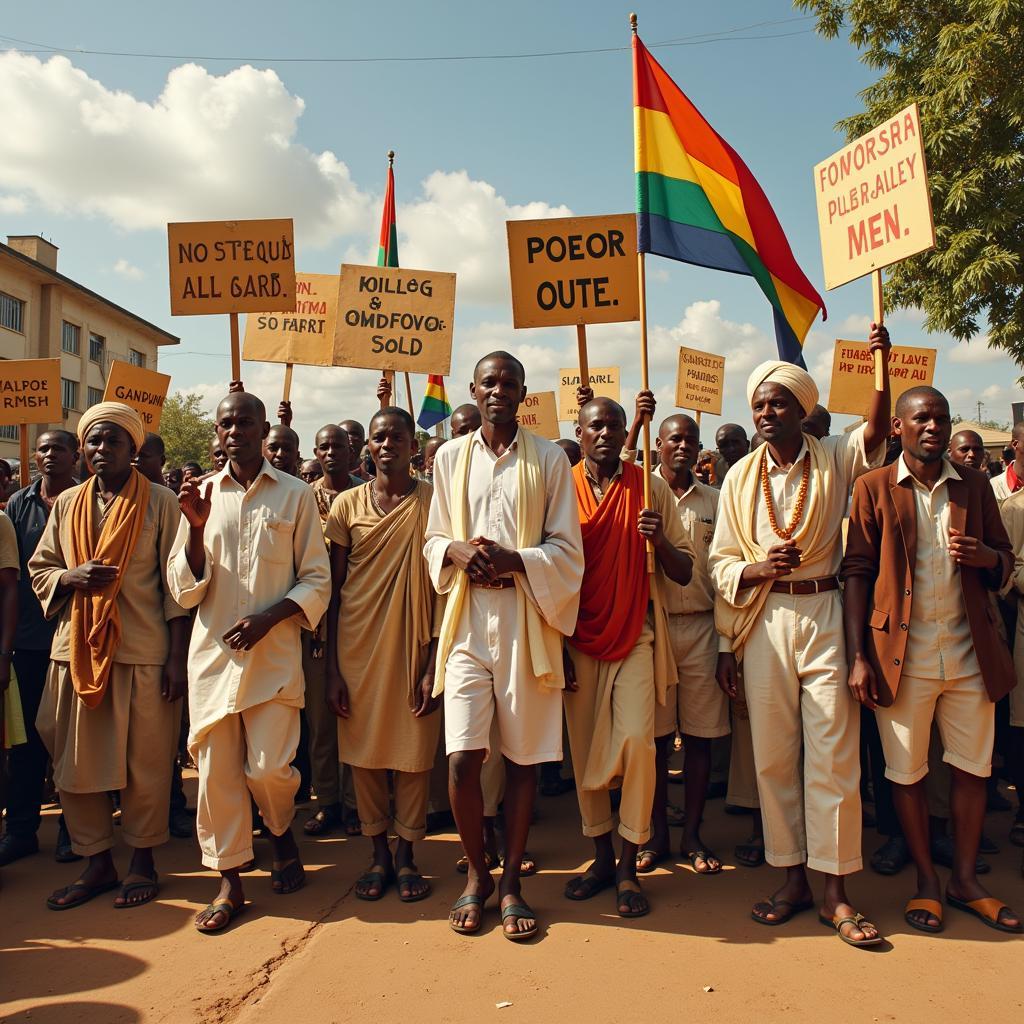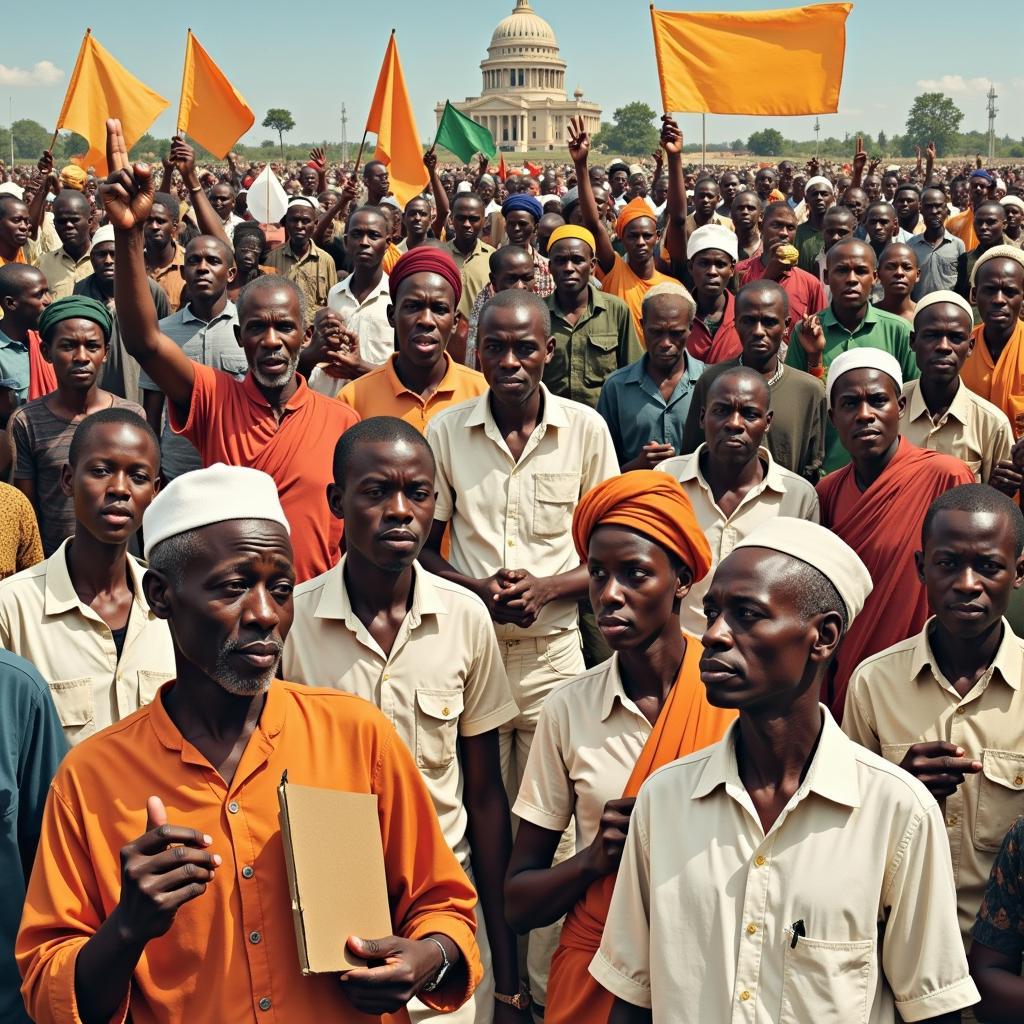Who is the African Gandhi?
The term “African Gandhi” has been attributed to several individuals across the African continent, reflecting the profound influence of Mahatma Gandhi’s philosophy of non-violent resistance. While no single figure perfectly embodies the title, several leaders have earned this moniker through their tireless fight against colonialism, oppression, and injustice.
Exploring the Legacy of Mahatma Gandhi in Africa
Mahatma Gandhi, though primarily known for his role in India’s independence movement, honed his philosophy of Satyagraha (truth force) during his time in South Africa. His experiences fighting racial discrimination and advocating for the rights of Indians in South Africa from 1893 to 1914 laid the groundwork for his later activism.
Gandhi’s teachings of non-violent resistance, civil disobedience, and self-reliance resonated deeply with African leaders battling colonial rule. His emphasis on truth, justice, and peaceful protest provided a powerful framework for their own struggles.
 African Leaders Embracing Gandhian Protests
African Leaders Embracing Gandhian Protests
Kwame Nkrumah: Champion of Pan-Africanism and Ghanaian Independence
Often cited as the “African Gandhi,” Kwame Nkrumah, Ghana’s first president, adopted Gandhian principles in his fight for Ghana’s independence from British rule. Nkrumah, deeply influenced by Gandhi’s teachings during his studies abroad, embraced non-violent resistance, leading boycotts and strikes that ultimately led to Ghana’s liberation in 1957.
Nkrumah’s vision extended beyond Ghana’s borders. He passionately advocated for Pan-Africanism, a movement promoting the unity and solidarity of African nations, echoing Gandhi’s vision of a united and independent India.
Julius Nyerere: Architect of Tanzanian Independence and Ujamaa
Julius Nyerere, Tanzania’s first president, is another prominent figure often dubbed the “African Gandhi.” Nyerere, drawing inspiration from Gandhi’s principles of self-reliance and communal living, spearheaded the Ujamaa policy, aimed at building a socialist and egalitarian society in Tanzania.
Nyerere’s leadership, characterized by its emphasis on dialogue, peace, and social justice, resonated with Gandhi’s philosophy. His commitment to non-violent resistance played a crucial role in Tanzania’s peaceful transition to independence in 1961.
 Key "African Gandhi" Figures Leading Peaceful Protests
Key "African Gandhi" Figures Leading Peaceful Protests
Kenneth Kaunda: Leading Zambia to Freedom with Gandhian Ideals
Kenneth Kaunda, Zambia’s first president, is yet another leader who adopted Gandhian principles in his struggle against British colonial rule. Kaunda’s unwavering commitment to non-violent resistance and his advocacy for human rights earned him recognition as a steadfast follower of Gandhi’s teachings.
Kaunda’s leadership, marked by its emphasis on dialogue and reconciliation, played a pivotal role in Zambia’s peaceful transition to independence in 1964.
Beyond the Title: The Enduring Relevance of Gandhian Principles in Africa
The legacy of the “African Gandhis” extends far beyond their individual achievements. Their embrace of Gandhian principles highlights the enduring relevance of non-violent resistance, dialogue, and social justice in addressing contemporary challenges facing the African continent.
african gandhi wikipedia provides further insights into the lives and contributions of these remarkable leaders.
From ongoing struggles against corruption and inequality to movements advocating for greater democracy and human rights, the spirit of the “African Gandhis” continues to inspire activists and leaders across Africa. Their unwavering commitment to peaceful change and their belief in the power of collective action serve as a beacon of hope for a more just and equitable future for all Africans.
FAQ: Unpacking the “African Gandhi” Narrative
1. Why is there no single “African Gandhi”?
The title “African Gandhi” is a symbolic representation of the profound impact of Mahatma Gandhi’s philosophy on African leaders. Several figures embody Gandhian principles, each contributing uniquely to their respective nations’ liberation and development.
2. How did Gandhi’s experiences in South Africa shape his philosophy?
Gandhi’s two decades in South Africa, facing racial discrimination and advocating for Indian rights, were formative in developing his philosophy of Satyagraha (truth force). He realized the power of non-violent resistance and civil disobedience as tools for social change.
3. What are some key similarities between Gandhi and the “African Gandhis”?
The “African Gandhis” shared Gandhi’s unwavering belief in non-violent resistance, his emphasis on dialogue and reconciliation, and his vision of a just and equitable society. They all drew inspiration from his teachings and adapted them to their unique contexts.
4. Is the “African Gandhi” title limited to political leaders?
While the term is often associated with political figures, individuals from various fields, including activists, educators, and artists, have embodied Gandhian principles in their work, contributing to positive change in their communities.
5. What is the significance of the “African Gandhi” legacy today?
The “African Gandhis'” enduring legacy lies in their demonstration of the power of non-violent resistance and their commitment to social justice. Their example continues to inspire individuals and movements striving for positive change across the African continent and beyond.
Need Assistance?
Contact us at:
Phone Number: +255768904061
Email: kaka.mag@gmail.com
Address: Mbarali DC Mawindi, Kangaga, Tanzania
We have a dedicated customer support team available 24/7 to assist you.
Explore More:
- african gandhinagar
- african development bank gandhinagar
- 2019 in which african country mahatma gandhi it
- african gahdhi
We encourage you to delve deeper into the fascinating stories of these remarkable leaders who shaped the destiny of Africa.

